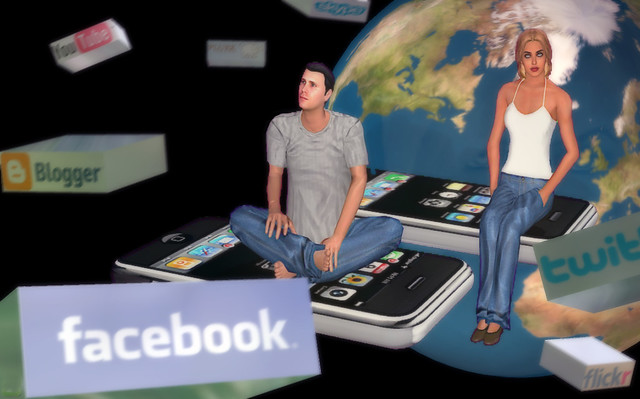 |
| Surfing between worlds. |
One of Second Life's biggest problems, says CEO Philip Rosedale, is that it's not enough like an iPhone. From the moment you open the box on an iPhone, it's fun to use, and in playing, you learn how to use it. The whole process is pleasurable. Second Life is nothing like that, learning to use it is a long process, and painful for many people. Philip Rosedale in interview with Mitch Wagner.There's scant debate in the Second Life Community that the SL client's steep (painful) learning curve is a key reason 99% of people who register for Second Life don't end up as active users. Nevertheless, the social networks were immediately full of snarky comments. Not that I don't like snarky comments. I'm just saying that I'm glad I don't have his job.
Narcissistic introduction aside, the most fascinating aspect for me when considering the juxtaposition of iPhones and Second Life is the relationship between the paradigms of Pervasive Computing and immersive Virtual Worlds.
Pervasive Computing is the first real step towards bona fide human cyborghood. I think Philip actually understated the transparent integration between device and mind/body for heavy users. When humans use tools, the brain experiences them as a temporary body part. Repeated use actually alters how the brain maps the physical body. For those of us who are almost never separated from a net-connected smart device, I think it is likely that our brains ends up treating the associated attributes as being physical capabilities, be they perception, memory or communication. So when we are separated from our devices it feels as if a part of our body or mind was taken from us.
 |
| Virtual Lobotomy |
A unique aspect of this transformation is that it is impossible to be fully present simultaneously within a virtual world and the physical world. Like the Rabbit-Duck Illusion, for those with distinct virtual identities you can only be fully one or the other at the same time. Like a ventriloquist and his dummy the sum is much less than the distinct parts.
As you've probably noticed, this post is more of a ramble than a thesis. I'll leave it here for now with a quote from Marshall McLuhan:
At the very high speed of living, everybody needs a new career and a new job and a totally new personality every ten years.

1 comment:
Wish could say totally understand the nuances of your discussion, with regard use of tools etc, so will stick to the original quote
"One of Second Life's biggest problems, says CEO Philip Rosedale, is that it's not enough like an iPhone. From the moment you open the box on an iPhone, it's fun to use, and in playing, you learn how to use it.
Let us not delude ourselves the main reason for this joy is Apps written by creators outside of the company "Apple" Apple in fact if similarity be drawn, provided a platform for said creators to create these Apps which augment the ipod, and without this tribe of creators the ipod would just be one more funky phone on the market.
The question we should ask with regard why SL not like the iphone, is whether this symbiotic between platform provider and creators, has been nurtured in SL?
Julius Sowu Virtually-Linked
Post a Comment